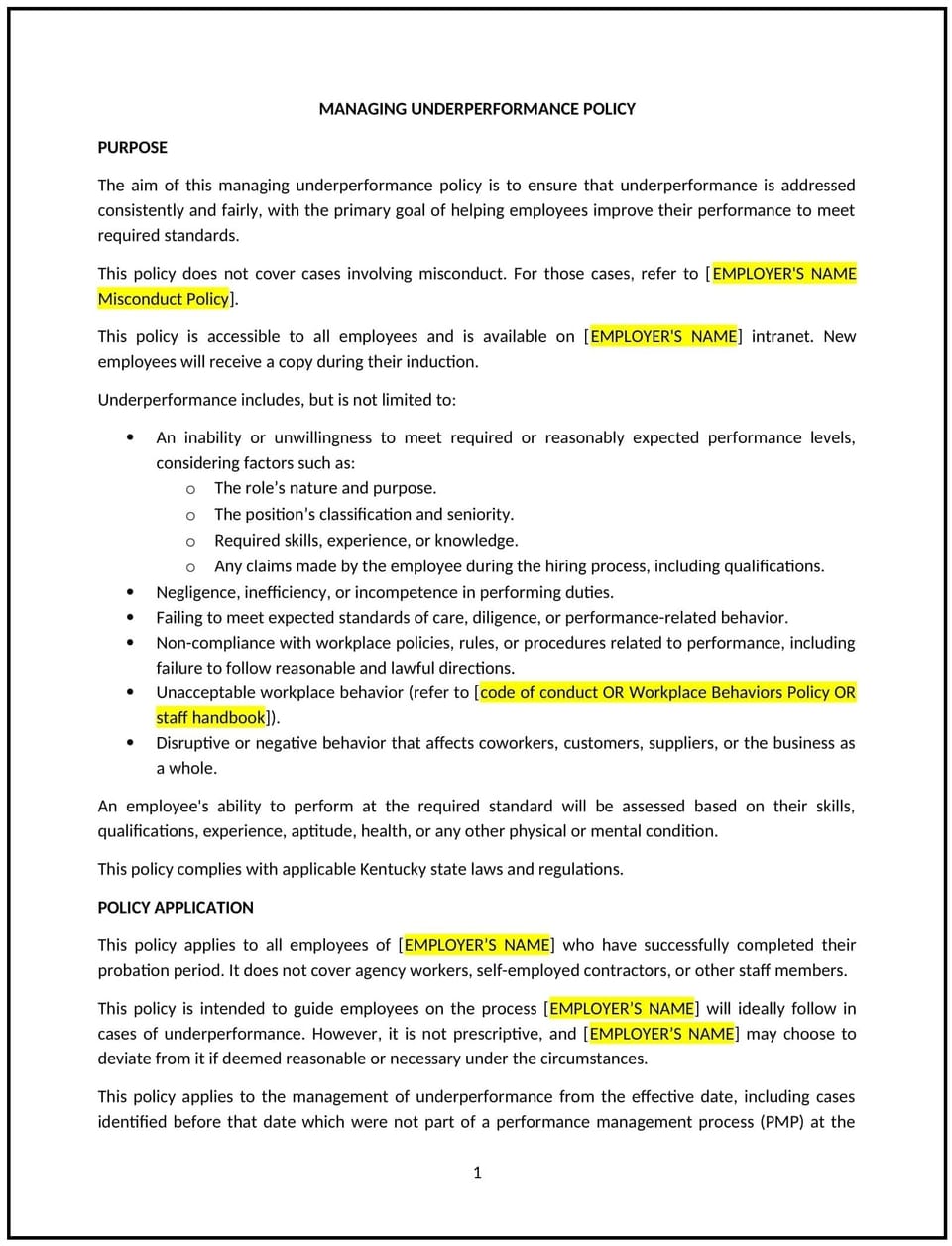Managing underperformance policy (Kentucky): Free template

Managing underperformance policy (Kentucky)
A managing underperformance policy provides Kentucky businesses with a structured approach to addressing employee performance issues effectively and fairly. This policy outlines the steps businesses can take to identify, address, and resolve performance concerns while supporting employees’ development and maintaining organizational productivity.
By adopting this policy, businesses can foster a culture of accountability, improve team performance, and minimize risks associated with unfair treatment or legal disputes.
How to use this managing underperformance policy (Kentucky)
- Define underperformance: Businesses should clearly outline what constitutes underperformance, such as failure to meet job expectations, poor attendance, or behavioral concerns.
- Set performance standards: Businesses should establish clear expectations for each role, ensuring employees understand their responsibilities and performance metrics.
- Identify performance issues: Businesses should monitor employee performance regularly and identify any gaps through reviews, feedback, or performance metrics.
- Implement a structured process: Businesses should outline steps for addressing underperformance, including providing feedback, setting improvement goals, and creating a performance improvement plan (PIP).
- Provide support: Businesses should offer resources such as training, coaching, or mentoring to help employees address performance issues effectively.
- Document actions: Businesses should maintain detailed records of all performance discussions, improvement plans, and outcomes to ensure transparency and compliance.
- Address non-improvement: Businesses should specify consequences if performance does not improve, including reassignment, demotion, or termination, following due process.
Benefits of using this managing underperformance policy (Kentucky)
This policy provides several key benefits for Kentucky businesses:
- Promotes fairness: Establishes a consistent approach to addressing performance issues, ensuring all employees are treated equitably.
- Enhances productivity: Helps employees identify and address performance gaps, improving overall team and organizational performance.
- Reduces legal risks: Minimizes the risk of disputes by documenting performance discussions and following a transparent process.
- Builds accountability: Encourages employees to take responsibility for their performance by providing clear expectations and support.
- Supports employee development: Provides employees with the tools and resources needed to succeed in their roles, fostering growth and retention.
Tips for using this managing underperformance policy (Kentucky)
- Communicate the policy: Businesses should share the policy with all employees and ensure managers are trained to address performance issues effectively.
- Provide regular feedback: Businesses should encourage managers to offer constructive feedback regularly to identify and address potential issues early.
- Involve HR when needed: Businesses should engage HR in significant performance discussions to ensure the process remains fair and compliant.
- Use PIPs effectively: Businesses should create detailed performance improvement plans with clear goals, timelines, and measurable outcomes.
- Review periodically: Businesses should update the policy as needed to reflect changes in Kentucky laws, organizational goals, or best practices.
Q: What is the purpose of a managing underperformance policy?
A: Businesses should use this policy to provide a structured process for addressing employee performance issues fairly and effectively.
Q: How can businesses identify underperformance?
A: Businesses should monitor performance through regular reviews, feedback, and performance metrics to identify gaps in expectations.
Q: What steps should businesses take to address underperformance?
A: Businesses should provide feedback, set clear improvement goals, create a performance improvement plan, and offer resources like training or coaching.
Q: What should businesses include in a performance improvement plan (PIP)?
A: A PIP should outline specific improvement goals, timelines, and measurable outcomes, as well as the support the business will provide to help the employee succeed.
Q: How should businesses document performance issues?
A: Businesses should maintain detailed records of all performance discussions, improvement plans, and outcomes to ensure transparency and legal compliance.
Q: What happens if an employee’s performance does not improve?
A: Businesses should follow the policy’s outlined consequences, which may include reassignment, demotion, or termination, while ensuring all steps are documented.
Q: How often should businesses review their managing underperformance policy?
A: Businesses should review the policy periodically to ensure it aligns with Kentucky laws, organizational needs, and industry best practices.
Q: How can businesses support employees during a performance improvement process?
A: Businesses should provide resources like training, coaching, or mentoring to help employees address performance issues and succeed in their roles.
This article contains general legal information and does not contain legal advice. Cobrief is not a law firm or a substitute for an attorney or law firm. The law is complex and changes often. For legal advice, please ask a lawyer.


